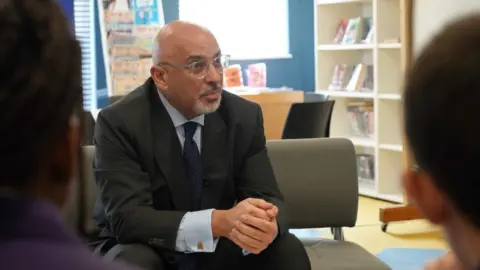England schools set for minimum week length in new rules
 Getty Images
Getty ImagesAll schools in England will have to open for at least 32.5 hours a week, under government plans due to be published this week.
The length of the school day is currently decided by the headteacher with the governing body in England.
The rule - which starts next September - will hit the 14% of schools thought to be open fewer than 32 hours a week.
Education secretary Nadhim Zahawi said he wanted "strong schools with great teachers for every child".
Some 70% of schools are already open between 32 and 35 hours a week, with a further 9% open for longer.
The data comes from a July 2021 government survey which asked schools how many hours a week pupils in years 3 or 9 had to be in school. About 6% of schools did not teach pupils in this age bracket.
The government said the change would ensure children had a fair chance to engage with a range of subjects - as well as any catch-up support - wherever they lived.
The 32.5 hour school week is equivalent to 08:45 to 15.15, with the government arguing that a child with a school day shorter by 20 minutes a day would lose two weeks of schooling over the course of a year.
But education unions said the new requirement would make little difference, as most schools already met the threshold.
They suggested schools that did not could be in rural areas which face greater transport challenges.
Mr Zahawi is due to set out the government's wider plans for schools in England this week in the White Paper, alongside a review of the support available for pupils with special educational needs and disabilities (SEND).

The plans include a target for 90% of pupils leaving primary school to be at the expected level for maths and English by 2030.
In the latest available figures from just before the pandemic, 65% of pupils in year 6 reached that level.
Speaking about the proposals on the BBC's Sunday Morning programme, Mr Zahawi said the White Paper would also put an emphasis on "strong multi-academy trusts".
He said: "The evidence is clear that a family of schools that is really tightly managed, really well supported - especially through Covid - has delivered better educational outcomes for children.
"So strong - and I underline strong - multi-academy trusts is the infrastructure we need to complete and deliver."
Labour shadow education secretary Bridget Philipson said after two years of "pandemic chaos" and six years since the government's last schools strategy, the plans would leave parents, teachers and pupils questioning "where the ambition for children's future is".
The National Education Union's Kevin Courtney said schools and pupils had been left "battered and bruised" by the pandemic and a more sophisticated approach was needed.
Paul Whiteman, of the headteachers union, the NAHT, said: "Simply adding five or 10 minutes to a day is unlikely to bring much, if any, benefit."
Asked on Sunday Morning if he could guarantee that schools would never close again in the way they did during lockdown, Mr Zahawi said; "I will do everything in my power to make sure they don't."
He also said he would be open to including the impact of lockdown on children in the terms of reference for the forthcoming government Covid inquiry - the draft terms of reference currently do not mention schools or children.
He said: "I would be open. I think it's important to learn the lessons... the impact on education and on health and wellbeing has been substantial, which is why I think it was a mistake to close schools - and we have to learn from those mistakes".

- THE KITCHEN GADGETS TIME FORGOT: Do you recognise any of these long-forgotten kitchen tools?
- FROM THE KGB TO THE KREMLIN: The revealing story of Putin's rise to power

